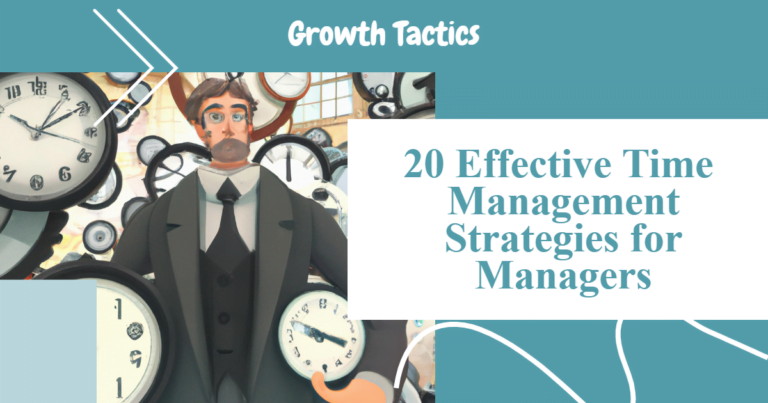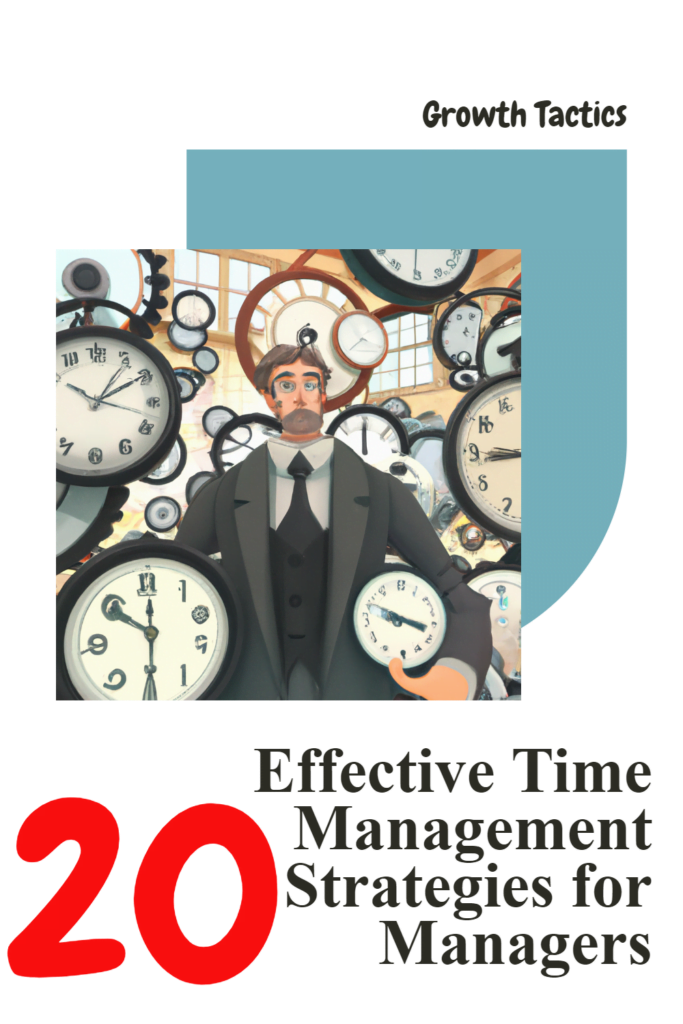In the ever-evolving landscape of management, mastering time management has been a pivotal chapter in my journey toward success. My years at the helm have taught me that the cornerstone of effective leadership isn’t just about making decisions or guiding a team; it’s about judiciously managing one of our most finite resources: time. These lessons in time management for managers have been instrumental in shaping a productive, fulfilling career trajectory.
Through trial and a fair share of errors, I’ve distilled a handful of strategies that have not only streamlined my workflow but also safeguarded my team’s productivity against the twin threats of burnout and inefficiency. As we navigate the complexities of the modern workplace, the wisdom gleaned from these experiences is a testament to the transformative power of time management skills, proving essential for any manager aiming to leave a mark in this fast-paced world.
Jump To Section
Understanding Time Management for Managers
Effective time management is crucial for managers looking to navigate the complexities of their roles efficiently. It’s about making strategic choices that elevate productivity and allow for a well-balanced approach to handling responsibilities. Key to this is learning how to prioritize tasks, delegate effectively, and ensure deadlines are met without compromising the team’s well-being or productivity.
Prioritization and delegation are at the heart of time management. By focusing on the most impactful tasks and understanding team members’ strengths, managers can optimize workload distribution, preventing burnout and boosting team morale. As we move towards 2024, these skills are increasingly important in adapting to fast-paced work environments and ensuring team success.
20 Strategies to Master Time Management
1. Prioritize Your Tasks
Effective task prioritization is foundational to time management. The Eisenhower Box, a simple yet powerful tool, helps categorize tasks into four quadrants based on urgency and importance. Tasks are divided into:
- Urgent and important (do these immediately),
- Important, not urgent (schedule a time to do these),
- Urgent, not important (delegate these if possible), and
- Neither urgent nor important (consider dropping these).
Focusing on tasks that provide the most value enables you to work more deliberately and efficiently.
2. Set SMART Goals
Goal setting is critical for direction and motivation. SMART goals are:
- Specific: Clearly define what you want to accomplish.
- Measurable: Ensure that you can track your progress.
- Achievable: Set goals that are realistic and attainable.
- Relevant: Your goals should matter to you and align with other relevant goals.
- Time-bound: Set a deadline to keep you focused.
This approach helps clarify your ideas, focus your efforts, and use your time productively.
3. Break Tasks into Smaller Steps
Large projects can be daunting and may lead to procrastination. By breaking them into smaller, more manageable steps, you not only make the task seem less intimidating but also allow for easier planning and execution. This approach provides quick wins and a sense of progress, sustaining motivation through longer projects.
4. Use a Planner
Organizing your tasks and appointments in a planner, be it digital or paper, is a straightforward method to manage your time effectively. A planner acts as a visual aid that helps you keep track of deadlines, meetings, and important events, ensuring nothing gets overlooked. This also aids in better planning to avoid overcommitting.
5. Implement the 2-Minute Rule
Coined by productivity consultant David Allen, the 2-minute rule states that if a task takes less than two minutes to complete, do it immediately. This simple yet effective strategy prevents the accumulation of minor tasks, which can become overwhelming over time. It also promotes a sense of achievement and productivity.
6. Learn to Say No
Time is a finite resource. Accepting tasks without considering your capacity can lead to stress and burnout. Learning to say no, politely but firmly, to additional tasks that don’t align with your priorities or capacity is crucial for managing your time well. This also allows you to focus on tasks of greater importance or value.
7. Delegate
Delegation is an important skill in both personal and professional life. Recognizing tasks that others can do allows you to focus on work that requires your unique skills or presence. This doesn’t mean shirking responsibility but rather effectively managing resources and time by entrusting tasks where appropriate.
8. Set Time Limits
Allocating specific amounts of time to tasks can prevent perfectionism and procrastination. This approach, known as timeboxing, involves setting a fixed, uninterrupted period to work on a task. It creates a sense of urgency that can boost focus and productivity, helping you keep forward momentum on your projects.
9. Avoid Multitasking
Although multitasking may seem efficient, it often leads to more time spent on tasks and decreased quality of work. Focusing on one task at a time promotes higher productivity and ensures work of better quality. It reduces errors and saves time that might otherwise be spent correcting mistakes or juggling tasks ineffectively.
10. Use Downtime Wisely
Identifying and utilizing short periods of downtime throughout the day can significantly enhance time management. Use these moments for small tasks like reading, planning, or answering emails. This helps keep your main work periods focused on more significant tasks, making overall time use more efficient.
11. Manage Distractions
Identify the triggers that pull you away from your work, which might include phone notifications, social media, or even noisy environments. Once you’ve identified them, take proactive steps to minimize these distractions, such as muting notifications, setting specific check-in times for apps, or creating a quiet, dedicated workspace.
12. Set Boundaries
Establishing clear boundaries between work and personal life is essential to maintain balance and prevent burnout. Communicate your work hours to colleagues and family, and stick to them. Avoid checking work emails or taking work calls during personal time, and vice versa.
13. Practice Time Blocking
Allocate chunks of time in your calendar for different types of tasks or projects. This strategy minimizes the loss of focus that comes with frequent switching between tasks, which can sap productivity. Grouping tasks by type or theme can make transitioning between them easier and more natural.
14. Reflect and Reassess
Regular self-assessment of how your time is being spent is critical to continuous improvement. Set aside time weekly or monthly to review what tasks took up your time and analyze the value they provided. Adjust your strategies and priorities based on these insights to become more efficient.
15. Batch Similar Tasks
Batch processing, the practice of grouping similar tasks, can enhance efficiency by reducing the start-up and slow-down time that occurs when switching between different tasks. This strategy can increase concentration and streamline workflows, particularly helpful for repetitive tasks such as email responses or data entry.
16. Practice Efficient Email Management
Instead of checking emails constantly, set specific times during the day for this purpose. This could be first thing in the morning, before or after lunch, and towards the end of the day. Use email filters, prioritization, and folders to keep your inbox organized and decrease the time spent managing emails.
17. Use Technology to Your Advantage
Leverage modern technology, like productivity apps and software, to assist in organizing your tasks, setting reminders, and tracking your progress. Tools such as Trello, Asana, or Todoist can help you manage projects and to-do lists more effectively.
18. Eat the Frog
Begin your day by tackling the most significant or unpleasant task (‘eating the frog’). Completing this early can provide a sense of accomplishment and improve productivity for the rest of the day. This approach prevents procrastination on important tasks that might otherwise loom over your day.
19. Maintain Your Health
A healthy lifestyle with regular physical activity, balanced nutrition, and sufficient sleep can have a profound impact on your productivity. These elements work together to improve cognitive function, energy levels, and overall well-being, which in turn enhances your ability to manage time effectively.
20. Stay Flexible
While planning and structure are essential, maintaining flexibility allows you to respond to unexpected events without significant disruption. Build buffer times into your schedule and reassess your priorities if circumstances change. Adaptability is crucial for managing your time well in a dynamic environment.
Mastering time management requires commitment and flexibility. By adopting these strategies, you can significantly enhance your productivity and find a better balance between work and personal life.
Implementing Time Management Strategies
From Strategy to Action
Implementing effective time management strategies requires more than just understanding the concepts; it’s about integrating these principles into your daily routine. The first step is to choose techniques that resonate with your personal and professional life. Begin by selecting one or two strategies, such as setting SMART goals or practicing the 2-minute rule, and consciously apply them every day. Gradually incorporate additional strategies as you become comfortable and notice improvements. Utilize tools and technology like digital planners or time management apps to support your efforts. The key is consistency and making these practices a part of your lifestyle to see real, lasting change.
Sustaining Improvements Over Time
To ensure that time management improvements are sustained over the long term, regular review and adjustment are imperative. Setting aside time monthly or quarterly to reflect on what’s working and what’s not allows you to adapt your strategies to evolving responsibilities and goals. Another crucial aspect is resilience; don’t be discouraged by setbacks or failures. Instead, view them as learning opportunities to refine your approach. Building a supportive environment, whether through colleagues who share your goals or through apps and tools that facilitate your strategies, can also play a significant role in sustaining improvements.
Healthy Boundaries and Self-Care
One of the pillars of effective time management is establishing healthy boundaries to protect your work-life balance. This might mean physically separating your work area from your living space, setting strict work hours, or learning to say no to additional responsibilities when you’re already at capacity. Remember, self-care is not a luxury but a necessity for maintaining high performance over time. Incorporate regular breaks, physical activity, and leisure activities into your schedule. By respecting these boundaries, you signal to both yourself and others that both your work and personal time are valuable.
Good Manager Practices
A good manager not only excels in managing their own time but also facilitates efficient time management within their team. This involves setting clear expectations, prioritizing tasks, and identifying goals that align with the team’s capabilities and the organization’s objectives. Effective delegation, based on understanding team members’ strengths and capacities, is another hallmark. Good managers also encourage and model healthy work-life balance, demonstrating the importance of time off for creativity and productivity. Open communication about time management challenges and successes within the team can foster a culture of continuous improvement and accountability. Lastly, recognizing and rewarding efficient time management in the team can reinforce these behaviors.
Conclusion
In wrapping up, it’s vital to recognize that mastering time management as a manager doesn’t necessitate the adoption of all 20 strategies discussed. The essence of effective time management lies in selecting and tailoring the approaches that resonate most with your personal and professional realities.
Embrace a few strategies that align with your management style and team dynamics, and observe the difference they make. The goal is not to overhaul your workflow overnight but to integrate adjustments that compound over time, enhancing productivity and work-life balance.
Remember, the journey toward effective time management is unique for each individual. Experiment, refine, and adapt these strategies to discover what best amplifies your managerial efficiency and well-being. By focusing on what truly works for you, you pave the way for a more organized, fulfilling, and balanced professional life.


